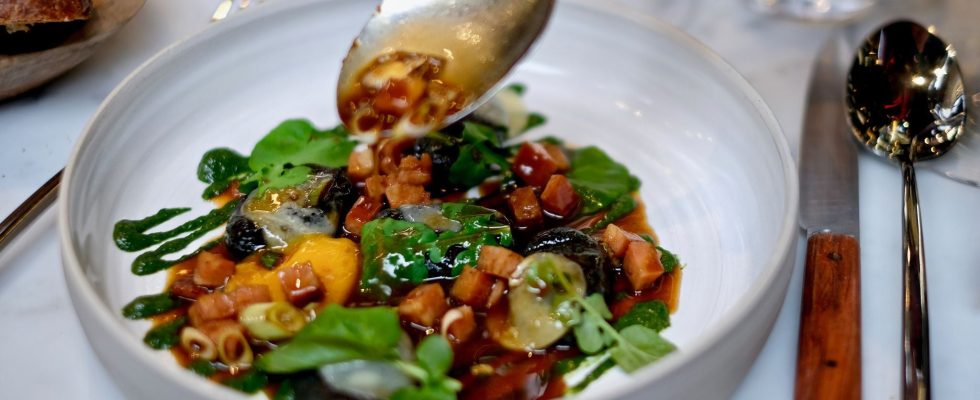On the menu of his restaurant, La Petite Expérience, in Paris, Gautier Mobuchon offers a fermented bitter chocolate mousse, a sourdough and pumpkin waffle… The young chef, who presents himself as an “artisan fermenter”, brings recipes up to date as old as the world. He is far from being the only one. Danone, Bel… More than twenty food manufacturers collaborate with ferment manufacturers (Lesaffre, Lallemand, etc.), research establishments, such as Inrae or AgroParisTech, and start-ups, within of the Ferments du Futur consortium. Launched in 2022 as part of France 2030, this initiative, endowed with 48.3 million euros and supplemented by private investments, should accelerate scientific knowledge of fermentation.
The stakes are considerable: by 2050, we will need to provide sufficient protein to 10 billion people, while reducing greenhouse gas emissions. Planting dishes seems inevitable to preserve the planet. Except that this transition to sustainable eating is not to everyone’s taste. Without cow, no casein which allows the milk to curdle, and therefore no reblochon. Lucky for gourmands, the ferments play the role of doubles. They provide necessary proteins, nutrients and vitamins, as well as aromas and colors.
“The field of possibilities is immense”
Apparently, everything has been under control for millennia: yeasts and bacteria thrive on carbohydrates, heat, oxygen and water. Bread, sauerkraut, wine… they are present in almost half of our menus. In reality, knowledge is empirical, and science still needs to progress. “There remain many associations of strains to characterize and isolate,” explains Damien Paineau, director of Ferments du futur. “We must also design industrial fermentation processes that save water and energy. The field of possibilities is immense.” Just like the business prospects. The SNS Insider firm estimates that the global fermentation market will exceed $36 billion by 2030. “The bacteria market alone should reach 20 billion euros in six years,” adds Christine M’Rini. Puel, director of R&D at Lesaffre.
At the forefront of innovation, the subsidiary of the northern group Ennolys by Lesaffre produces vanillin, a flavor which is not extracted from a pod but from the fermentation of bran. Also in the catalog, coconut or caramelized butter flavors. Ingredients that make it easier to obtain a good Nutri-Score. The notation affixed to most packaging sanctions the presence of synthetic additives. The ferments, considered to be of natural origin, are better rated.
Another advantage: they proliferate on co-products, such as molasses. In fact, any substrate rich in carbon is enough to keep them happy. So why not use CO2? “Lesaffre’s scientific teams are working on the use of carbon dioxide within five years, confirms Christine M’Rini Puel. Other avenues of research concern food, industrial and agricultural waste, such as animal bedding. “Today, fermentation is a major player in the ecological transition.”
Even more futuristic, start-ups are betting on precision fermentation, which involves modifying the genome of a yeast or bacteria so that it produces the desired proteins. This technique is already used in medicine to manufacture insulin. In food, to obtain casein for example, it is necessary to implement into the microorganism a cow gene coding for the desired protein. Once this operation is completed, this new ferment proliferates in particular on the molasses at a temperature between 30 and 37°C. Then, a purification process makes it possible to recover an essential ingredient for successful “replicas” of dairy products… without cattle.
Public distrust
To observe this fine white powder presented in a sachet, you have to open the door of the Standing Ovation laboratory in Paris. Romain Chayot, who co-founded the foodtech in 2020, markets the first casein substitutes to food manufacturers wishing to green their offering. In 2022, the Bel group took a stake in Standing Ovation during a fundraising of 12 million euros. Objective: to develop the vegetarian recipes of tomorrow. Except that in France, the regulatory framework for GMOs is very strict. Not to mention the mistrust of public opinion.
“The genetically modified organism is not found in the final protein,” assures Romain Chayot. However, foodtech is still awaiting the opinion of the European Food Safety Authority (EFSA). For Brussels, any food that did not exist in the human diet before 1997 is considered a “new food”, and must obtain the green light from EFSA. “We are confident that we will obtain authorization before placing it on the market by 2026,” insists Romain Chayot. Once the administrative barrier has been overcome, it will be necessary to move on to the industrial production stage, and define a method of labeling, in order to reassure a very wary consumer. To convince, fans of precision fermentation ensure that their technology emits less CO2 and consumes less water and fertile land than breeding. A complex debate, which provokes the ire of meat lovers.
While waiting for 2026, the market is developing across the Atlantic, where authorization from the Food and Drug Administration (FDA) is quicker to obtain. Founded in 2014, the Californian start-up Perfect Day – also a partner of Bel – has a vast catalog of solutions for developing ice creams, yogurts, spreadable cheeses, etc. Standing Ovation plans to supply around ten tonnes of ingredients to the States -United. For its part, Bon Vivant, another French start-up, anticipates marketing in spring 2025. In order to last over the long term, it has raised 15 million euros from Sofinnova Partners. France is not just the country of cheeses.
.
